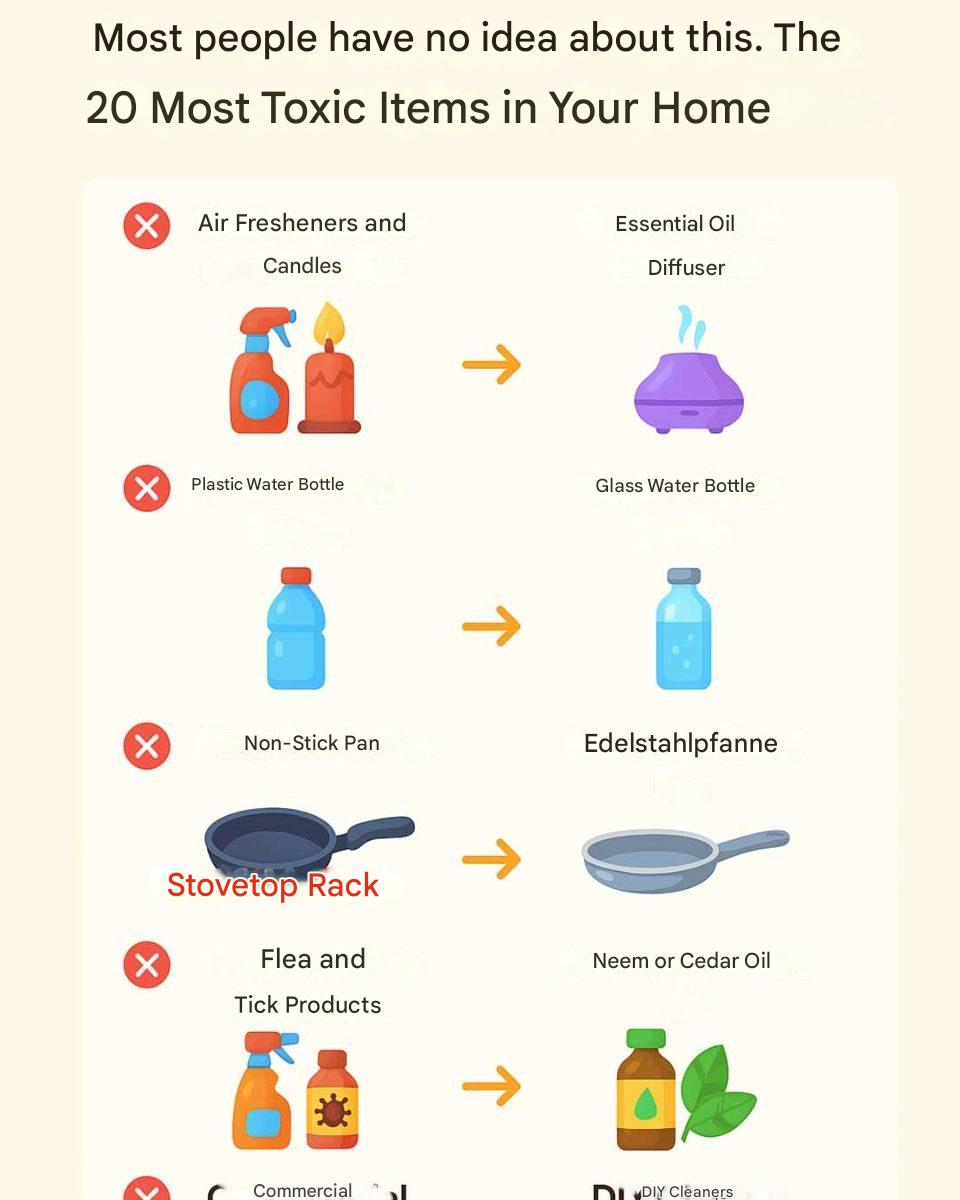Many household cleaners contain a mix of chemicals that can be harmful if inhaled or touched. Ingredients like ammonia, bleach, and quaternary ammonium compounds can cause respiratory irritation and other health problems.
Instead, use homemade cleaners made from white vinegar, baking soda, and lemon juice, or choose certified, non-toxic, plant-based brands like Branch Basics or Seventh Generation.

Most people have no idea about it. The 20 most toxic items in your home
6. Antibacterial Soaps: The Risk of Overdose
Antibacterial soaps often contain triclosan, an ingredient that can contribute to antibiotic resistance and disrupt hormone levels. Studies suggest that regular soap and water are just as effective for hand cleaning.
Instead, use regular soap and water or gentle, natural hand soaps without triclosan or synthetic fragrances.
Antibacterial soaps often contain triclosan, an ingredient that can contribute to antibiotic resistance and disrupt hormone levels. Studies suggest that regular soap and water are just as effective for hand cleaning.
Instead, use regular soap and water or gentle, natural hand soaps without triclosan or synthetic fragrances.
7. Mothballs: The Danger of Pest Control
Mothballs contain naphthalene or paradichlorobenzene, both toxic chemicals that can cause respiratory problems and other health issues if their fumes are inhaled.
Use instead: Store clothes with cedar shavings, lavender sachets, or use airtight containers to naturally prevent moth infestations.
Mothballs contain naphthalene or paradichlorobenzene, both toxic chemicals that can cause respiratory problems and other health issues if their fumes are inhaled.
Use instead: Store clothes with cedar shavings, lavender sachets, or use airtight containers to naturally prevent moth infestations.
8. Flea and Tick Treatments: The Problem of Animal Welfare.
Flea and tick treatments for pets often contain pesticides that can be harmful to both animals and humans. Ingredients like permethrin and fipronil can cause skin irritation and more serious health problems with prolonged exposure.
Use instead: Try natural flea collars, food-grade diatomaceous earth, or veterinarian-approved essential oil-based treatments like neem or cedar oil.
Flea and tick treatments for pets often contain pesticides that can be harmful to both animals and humans. Ingredients like permethrin and fipronil can cause skin irritation and more serious health problems with prolonged exposure.
Use instead: Try natural flea collars, food-grade diatomaceous earth, or veterinarian-approved essential oil-based treatments like neem or cedar oil.
9. Fabric Softener: The Fabric Softener Trap
Fabric softeners can contain various chemicals, including quaternary ammonium compounds, which can cause skin irritation and respiratory problems. They also often contain synthetic fragrances that contribute to indoor air pollution.
Try using them instead: Add half a cup of white vinegar to the rinse cycle or use wool dryer balls with a few drops of essential oils.
Fabric softeners can contain various chemicals, including quaternary ammonium compounds, which can cause skin irritation and respiratory problems. They also often contain synthetic fragrances that contribute to indoor air pollution.
Try using them instead: Add half a cup of white vinegar to the rinse cycle or use wool dryer balls with a few drops of essential oils.
10. Carpet Cleaners: The Fresh Facade
Carpet cleaners often contain harsh chemicals like perchloroethylene and naphthalene, which can cause dizziness, nausea, and even liver and kidney damage if exposed for extended periods.
Instead: Use a steam cleaner with plain water or a vinegar-water solution, or choose environmentally friendly carpet shampoos like those from Biokleen or ECOS.
Carpet cleaners often contain harsh chemicals like perchloroethylene and naphthalene, which can cause dizziness, nausea, and even liver and kidney damage if exposed for extended periods.
Instead: Use a steam cleaner with plain water or a vinegar-water solution, or choose environmentally friendly carpet shampoos like those from Biokleen or ECOS.
11. Oven cleaners: The smoke factor.
Oven cleaners are known for their strong chemical composition and often contain lye and ammonia. These ingredients can produce harmful fumes that irritate the respiratory tract and skin.
Instead, use: Mix a paste of baking soda and water, apply it to the oven surfaces, let it sit overnight, and wipe it down with vinegar for additional degreasing.
Oven cleaners are known for their strong chemical composition and often contain lye and ammonia. These ingredients can produce harmful fumes that irritate the respiratory tract and skin.
Instead, use: Mix a paste of baking soda and water, apply it to the oven surfaces, let it sit overnight, and wipe it down with vinegar for additional degreasing.
12. Drain Cleaners: The Caustic Dilemma
Drain cleaners are highly caustic and can cause severe burns upon contact with skin. They often contain sodium hydroxide or sulfuric acid, which can emit dangerous fumes.
Use instead: Pour boiling water down the drain, add baking soda and vinegar. Let it work, then rinse with hot water or use a drain snake.
Drain cleaners are highly caustic and can cause severe burns upon contact with skin. They often contain sodium hydroxide or sulfuric acid, which can emit dangerous fumes.
Use instead: Pour boiling water down the drain, add baking soda and vinegar. Let it work, then rinse with hot water or use a drain snake.
